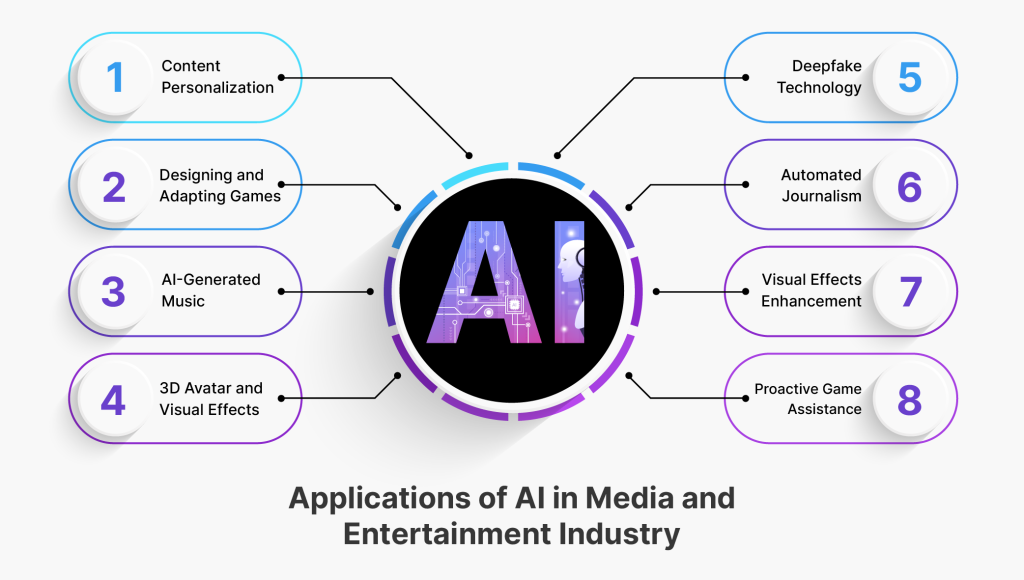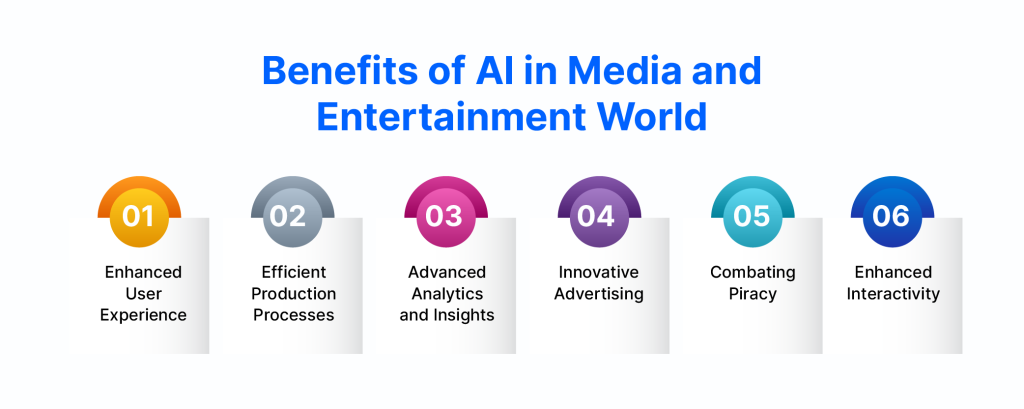When teams operate independently, it creates communication gaps that can lead to disorder. In contrast, when teams collaborate, they tend to be more efficient.
In 2020, the film business was valued at approximately 183 billion rupees during the fiscal year. This was predicted to drop by more than half the next year as a result of the COVID-19 epidemic. On the other hand, estimates for the fiscal year 2022 indicated a 196% growth.
When you open your streaming service right before you settle down to watch a movie, you can be met with a selection of suggestions that seem as though they were chosen especially for you. The plot, the characters, and even the music all appear to perfectly suit your tastes. This is artificial intelligence (AI) at work in the media and entertainment sector; it is not magic. Social media and artificial intelligence intersect to personalize user experiences and streamline content delivery. This article will examine the intriguing application of artificial intelligence (AI) in media and entertainment, highlighting its advantages, use cases, and practical applications that demonstrate its significant influence on how we produce and consume entertainment.
he media and entertainment business are only one of the many industries that artificial intelligence (AI) has revolutionized. Artificial intelligence (AI) has revolutionized the way we produce and consume entertainment, from improving content recommendation systems to fostering new breakthroughs.
AI is revolutionizing the development, curation, and consumption of content in media and entertainment. It is transforming the entertainment experience by providing personalized suggestions, helping with content development, improving user interaction through chatbots, helping with content curation, and enabling in-depth content analysis. AI entertainment is shaping the future of how we consume media, offering immersive experiences and tailored recommendations. AI in entertainment harnesses image recognition for immersive experiences, personalized content recommendations, and innovative applications in gaming, filmmaking, and virtual reality.
Movies such as “Her,” “Blade Runner 2049,” and “Ex Machina” have effectively conveyed the impact of artificial intelligence on our imagination and the significant concerns it poses for the future.
Grand View Research reports that the worldwide AI industry for media and entertainment has achieved a noteworthy valuation of USD 10.87 billion.
AI is completely transforming the media and entertainment sector, including advertising, book publishing, gaming, music, cinema, and television, as well as content production. AI seems to be this magical wand that enhances creativity and innovation in everything. AI foundation models underpin advancements in AI in entertainment, driving innovation in content creation, recommendation systems, and immersive experiences.
Artificial intelligence in entertainment is revolutionizing content creation and distribution, ushering in a new era of creativity and engagement. It’s amazing to watch how creativity and technology are combining to transform media creation, distribution, and consumption in the digital age. Examples of entertainment powered by artificial intelligence range from algorithmic music composition to AI-generated visual effects in films. Here are a few examples of AI in Media and Entertainment:

AI algorithms analyze user behavior, preferences, and consumption patterns to offer personalized content recommendations on streaming platforms like Netflix or Spotify. This not only enhances user engagement but also helps in discovering new content tailored to individual tastes. Artificial intelligence in the media industry is driving innovation, optimizing content distribution and audience engagement through data-driven insights and personalized experiences. Delve into the world of content personalization and explore the AI challenges reshaping how businesses engage with audiences on a more individualized level.
AI systems are able to evaluate user feedback, gameplay data, and market trends in order to assist game developers in creating engaging and harmonious gaming experiences. AI improves game design by identifying trends, honing mechanisms, and suggesting improvements based on user preferences. It may also dynamically change the game’s difficulty based on how well players perform, ensuring a demanding but entertaining experience.
AI systems can now compose original music in various genres, offering new tools for artists and producers. Platforms like AIVA (Artificial Intelligence Virtual Artist) can create emotional soundtracks for games, films, and commercials, demonstrating AI’s creative capabilities. AI in entertainment is revolutionizing how we experience movies, enhancing everything from special effects to personalized recommendations.
AI can expedite and improve the process of creating visual effects (VFX) for motion pictures. It can provide lifelike computer generated imagery, improve background scenes, and streamline the compositing workflow. Filmmakers may produce more intricate and lifelike effects while also saving time and money by doing this. The use of AI in entertainment allows for more immersive gaming experiences, with adaptive storylines and dynamic challenges.
AI can be utilized, for instance, to generate synthetic doubles of actors for usage in instances where the real actor is either unavailable or too dangerous to film. Additionally, AI can be utilized to construct realistic landscapes, such as cities or forests, for use in films that would be too costly or challenging to film on location. There are also several image classification datasets available for training machine learning models.
In the film industry, AI-powered deepfake technology allows for the creation of realistic digital doubles or altering actors’ facial expressions. Although it raises ethical concerns, this technology has been used in filmmaking and advertising to de-age actors or bring deceased stars back to the screen. The entertainment industry is leveraging artificial intelligence to enhance user experiences, from AI-powered recommendation engines to immersive virtual reality experiences.
Artificial intelligence and media are shaping the future landscape of storytelling, enabling interactive narratives and personalized content delivery. AI is used to automate the generation of news reports, especially for data-driven stories like sports results or financial updates. This allows media outlets to produce content more quickly and efficiently, freeing human journalists to focus on in-depth investigative reporting.
AI is instrumental in enhancing visual effects in movies and video games. It can automate tedious processes, like rotoscoping, and contribute to creating more realistic and intricate visual effects, such as realistic weather patterns or detailed backgrounds.
AI agents are able to provide gamers with real-time assistance and direction while they are playing. AI can improve player performance and enjoyment by analyzing player activities and providing strategies, advice, and customized recommendations.
This kind of direct game support is especially helpful when players are faced with challenging or complex game circumstances. It helps players overcome obstacles, find hidden aspects, and stay engaged. The AI can modify its advice in response to every player’s distinct behavior, making sure that it is still useful and effective.
AI has brought numerous benefits to the media and entertainment industry, revolutionizing the way content is created, distributed, and consumed. Virtual assistants powered by AI in entertainment platforms are reshaping how users interact with content, offering tailored suggestions and intuitive navigation. AI image generators are readily accessible, with a recent example being a Japanese advertisement entirely crafted by AI. However, the concern goes beyond the potential displacement of creative talent. As noted in an editorial by Cristel Russell, a marketing professor at Pepperdine Graziadio Business School, and her co-authors in the Journal of Advertising, there are broader societal and policy considerations regarding the truthfulness and authenticity of AI-generated content. Here are some key advantages you can discuss in your blog:

AI algorithms provide personalized content recommendations, ensuring that users are more likely to find movies, music, shows, and games that match their preferences. This personalization enhances user engagement and satisfaction, increasing the likelihood of longer session times and loyalty to platforms.
AI can streamline various production tasks, such as video editing, color correction, and sound design, making these processes more efficient and cost-effective. This efficiency can lead to faster content creation cycles, allowing media companies to release content more regularly.
AI-driven analytics help media companies understand audience preferences and behavior in real-time, enabling them to make data-driven decisions. These insights can guide content creation, marketing strategies, and distribution, maximizing reach and impact.
AI enables more targeted and effective advertising by analyzing viewer data to deliver relevant ads, improving the return on investment for advertisers. It can also create dynamic ad content tailored to the viewer, enhancing engagement and conversion rates.
AI can help detect and combat content piracy by monitoring the internet for unauthorized distributions, protecting intellectual property rights and revenue streams for content creators and distributors.
AI enables more interactive and immersive experiences, particularly in gaming and virtual reality. AI-driven characters and environments respond to user actions in nuanced and unpredictable ways, enhancing the realism and engagement of these experiences. AI and media converge to redefine how we engage with digital content, from personalized news feeds to interactive entertainment experiences. AI in media and entertainment is transforming industries, from predictive analytics in film production to virtual influencers on social platforms.
The future of entertainment lies in the integration of AI and media, where algorithms drive personalized content discovery and immersive storytelling experiences. The merging of virtual and augmented reality (VR and AR) is revolutionizing the entertainment business by providing spectators with more immersive experiences in live events, gaming, cinema, and television. VR concerts and interactive media storytelling are growing in popularity because they give audiences a more engaged experience. Another popular trend is personalization, which is fueled by AI and machine learning. Entertainment firms use data to provide customized advertising and recommendations for material that is specifically suited to their audience. The new security system utilizes AI face recognition to grant access to authorized personnel.
The use of AI in media and entertainment will only increase as technology develops and more businesses adopt tailored approaches to boost revenue and audience engagement. Furthermore, it is anticipated that virtual news anchors and avatars created by AI will become commonplace, providing news in a way that is immersive and captivating for a wide range of languages and demographics.
When considering AI development services, IntellicoWorks emerges as a premier choice for several compelling reasons. Firstly, IntellicoWorks boasts a team of seasoned AI experts with extensive experience in developing cutting-edge solutions across various industries. Their deep domain knowledge and technical proficiency enable them to deliver tailored AI solutions that address specific business needs effectively.
IntellicoWorks prioritizes innovation and stays abreast of the latest advancements in AI technology. This ensures that clients benefit from state-of-the-art solutions that leverage the most advanced algorithms and methodologies available. Our company specializes in providing AI development services to help businesses leverage cutting-edge technology for enhanced efficiency and innovation.
Artificial Intelligence has become an integral part of the media and entertainment sector. It has a significant impact on all facets of the entertainment journey of the consumer, from content development to content discovery. AI’s role in media and entertainment will grow as technology develops, bringing in a new era of engagement, creativity, and innovation. Discover how AI is revolutionizing customer experience in the media industry, reshaping interactions and enhancing engagement.
Embracing AI in this dynamic industry promises an entertainment experience that is exactly tuned to your interests and opens doors to endless possibilities, whether you are an avid consumer of entertainment, media company, or content provider.
Take Your Ideas to AI Reality! Partner with Us for Tailored Development Services

Talk to us and let’s build something great together
A Subsidiary of Vaival Technologies, LLC
IntelliCoworks is a leading DevOps, SecOps and DataOps service provider and specializes in delivering tailored solutions using the latest technologies to serve various industries. Our DevOps engineers help companies with the endless process of securing both data and operations.
Ops
Cloud
AI & ML
Copyrights © 2023 byIntellicoworks. All rights reserved.